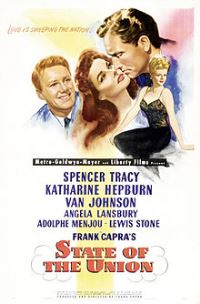 Originally released 30 Apr 1948
Originally released 30 Apr 1948
Written by Anthony Veiller and Myles Connolly
Directed by Frank Capra
Starring Spencer Tracy, Katharine Hepburn, Van Johnson, Angela Lansbury, and Adolphe Menjou
My rating: ★★★ 1/2 stars
Legendary duo Katharine Hepburn and Spencer Tracy shine in Frank Capra’s populist take on presidential politics.
Confronted with the virtually inevitable election of a Democrat in the upcoming presidential election, the Republican Party turns their support to a businessman with no political experience. Critics have claimed that Frank Capra films are unrealistic fairy tales, but something about State of the Union seems potentially plausible to me.
The similarity of the plot of a 1948 fictional film to a real life election 68 years later is not coincidence. The most salient feature of Frank Capra’s films is his populism—the drive in his films to stand up for the little guy against entrenched power. And populism is what’s driving much of the support of the candidacy of Donald Trump.
Unlike Trump, however, Grant Matthews (Spencer Tracy) is self-made, unassuming, and down-to-earth. He is no Jefferson Smith (James Stewart’s character in Capra’s Mr. Smith Goes to Washington) either, however. He’s a man of comfortable middle age who knows what he believes and is not naïve to the ways of the world. And, yet, the story’s complications arise when Matthews compromises his ideals in order to garner support from Washington power-brokers. In the film, this selling out in order to get elected is the ultimate betrayal. And this notion, the condemnation of dishonesty in politics, of political opportunism, and of the infidelity to principle, mirrors the animus behind many voters in this current election cycle.
Initially, like many Hollywood politicians, Matthews is hard to pin down to any particular ideology. He seems the perfect candidate. He’s pro-business and pro-labor. Republican kingmaker Jim Conover (Adolphe Menjou) doesn’t dig too deeply into Matthews’s views. He just wants a candidate he can back opposite Harry Truman. Matthews claims to be a Republican, but the film doesn’t delve into what that stands for. As Matthews gets deeper into his candidacy, he promotes populist measures like universal health care and subsidized housing for the poor. He also opposes tax reduction. His strangest view is his belief in the need for a single-world government (currently, a bugaboo among many fringe conspiracy theorists). But the film presents those policies in a neutral manner. The problem with Matthews is not what he supports or opposes but the fact that he comes to support or oppose whatever will please the people he is with at the moment.
Most disappointed with Matthews’s actions is his wife, Mary (Katharine Hepburn). The film’s title holds a double meaning. Not only does it reference the political storyline, it alludes to a narrative about the characters’ marriage. And the state of their union is not good. While Mary shares many of Matthews’s professional and political goals, the two have been estranged for some time. She spends her time with her children and working for various charities, and he spends his time with newspaper magnate Kay Thorndyke (Angela Lansbury). The film is refreshingly open about the nature of Matthews and Kay’s relationship, perhaps as a result of its origin as a Broadway play (which won the Pulitzer Prize for writers Howard Lindsay and Russel Crouse) as opposed to an original Hollywood screenplay, Broadway tending to be less circumspect than Hollywood about adult matters.
In that Mary is presented as a paragon of integrity whose purpose is to provide an example of virtue to her husband, her characterization reflects antiquated notions of gender and relationship roles. However, Katharine Hepburn presents such a nuanced and intelligent performance that I can overlook the dated nature of the narrative’s presentation of the character. In one of the movie’s best scenes, Matthews and Mary share a heart-to-heart about his desire to run for president while lying down for the night—Mary in bed, Matthews on the floor. Although Tracy is placed in the foreground and his character is speaking, he is out of focus. Capra focuses the camera on Hepburn in the midground as she reacts to what Tracy says. Watching the complex play of emotions on her face is captivating.

Lansbury, as the other woman, plays the kind of hard-edged role that was typical of her early career. At 22, she looks too young for the role, but she pulls off the part. The script gives her some nice moments when she can let emotion peek through her tough, no-nonsense façade. Typically for the era, the career woman must not succeed over the domestic woman.
The other major supporting role is Van Johnson’s newspaperman, Spike McManus, dispatched by Kay to follow the Matthews campaign around the country. Spike recalls Babe Bennett, the Jean Arthur character in Capra’s Mr. Deeds Goes to Town, a cynical reporter who comes to believe in the idealistic Mr. Deeds. Here, Spike, too, undergoes a change of attitude from cynical condescension to idealism. However, he never manages to embrace fully the notion of authenticity as a virtue in politics. Johnson, here, is more appealing than he is in leading roles. He seems more natural as a second banana than as a leading man.
As intriguing and timely as the political narrative is in State of the Union, the great strength of the movie is the pairing of Hepburn and Tracy. I admit that I’m not a big fan of their on-screen pairing. Too often, it seemed that the purpose of Tracy’s characters was cut the independent women whom Hepburn played down to size. This movie presents a different dynamic. There is less competition between the characters. They show a deep love and respect for each other even through disagreements and estrangement. The actors bring a sense of naturalness to the relationship bred by years of familiarity. They (the characters and performers blending together) know each other’s rhythms and seem to communicate without words.
State of the Union displays all-around solid filmmaking. The political and personal narratives dovetail nicely. Capra deftly controls the picture without calling attention to his hand. And above all, Hepburn and Tracy, working seamlessly together, give a magnificent joint performance.

Excellent review. Makes me what to see the film again. Saw it when I was much younger.
I have a hard time with the Hepburn-Tracy vehicles. They depend so much on “battle of the sexes” rhetoric that was popular in the era, and it turns me off. Do you prefer this film to Woman of the Year and Adam’s Rib?
I understand your issues with the Tracy-Hepburn films; I have the same problem. I definitely prefer the dynamic between them here to that in Woman of the Year and Adam’s Rib. This is not a battle of the sexes film at all. In fact, what ever the problems in the marriage, the two have a very respectful partnership in the film.
Maybe I’ll watch it again sometime!
[…] STATE OF THE UNION (1948) […]